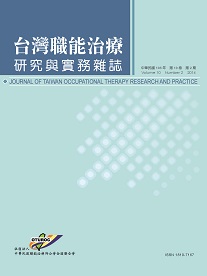Journal of Taiwan Occupational Therapy Research and Practice

半年刊,正常發行
目的:本研究以職能治療的專業觀點為基礎,針對接受冠狀動脈繞道手術患者,擬定並執行 8 週的自我管理方案介入,以檢視此自我管理方案的療效。方法:以方便取樣的方式,於奇美醫院共招募 13 位受試者參與研究(6 位實驗組及 7 位控制組)。實驗組及控制組皆接受心肺物理治療,為期 8 週,每週 2 次,每次 40 分鐘;而實驗組則在每次心肺物理治療前,額外接受由職能治療師設計的自我管理方案,以團體的方式進行,為期8週,每週 2 次,每次 1 小時。自我管理方案的內容包括:放鬆技巧、危險病徵之自覺、呼吸訓練、日常生活訓練及生活形態改造等。主要結果測量則針對因應方法、情緒和壓力,以及生活品質的三個向度,分別以因應方法量表-修訂版、 狀態-特質焦慮量表,以及生活品質量表 (SF-36) 進行測量。結果:僅實驗組在介入後的生活品質量表 (SF-36) 的身體生理功能與前測相比有顯著改善 (p = .03),且改善程度為 41%。其餘的變項在組間及組內皆無顯著差異。進一步檢視效應值發現,『期望式思考因應策略』以及『責備自我式因應策略』皆具有高度的效應值;這也使得『情緒導向因應策略』總分具有中度的效應值。其餘具有中度效應值的為『問題導向的因應策略』總分、生活品質量表 (SF-36) 的身體生理功能、身體健康引起的角色限制、活力狀況及情緒問題引起的角色限制。結論:本研究發現,接受冠狀動脈繞道手術的個案在接受心肺物理治療及職能治療為期八週的自我管理方案後,實驗組在身體生理功能有顯著的提升,並有減少使用較為負向的期望式思考因應策略來面對壓力的趨勢,而所有個案在憂鬱及焦慮則有輕微的上升,顯示自我管理方案對於個案可能有潛在的效益,需要進行更多的探討。
Purpose: The study was to investigate the short-term effect of 8-week self-management program led by occupational therapists for people with coronary bypass surgery. Methods: Through convenience sampling, 13 participants were recruited in the outpatient clinic of Chimei Hospital Rehabilitation Clinic and were randomly assigned to the experimental group (N = 6) or the control group (N = 7). All participants received cardiopulmonary physical therapy twice per week, 40 minutes per session and 8 weeks in total. The experimental group received additional self-management program led by occupational therapist just prior to the cardiopulmonary physical therapy. The self-management program was provided twice per week, 60 minutes per session and 8 weeks in total and was conducted as a group. The training protocols mainly included relaxation techniques, self-awareness of dangerous signs, breathing exercises, training of activities of daily living and lifestyle redesign. Revised Ways of Coping Checklist (RWCC), State-Trait Anxiety Inventory (STAI) and Short Form 36 Health Survey (SF-36) were used as outcome measures for assessing coping strategies, anxiety and depression status and quality of life respectively. Results: The experimental group showed significant within group difference in the domain of physical function in SF-36 (p = .03) and the improvement was 41% before and after treatment. No other significant difference was found between groups and within groups. A further examination of effect size between groups revealed the large effect size in wishful thinking and self-blame coping strategy of RWCC which led to the medium effect size of the total score of emotion-focused coping strategy. Another three outcome measures showed medium effect size which were the total score of problem-focused coping strategy of RWCC, the domain of physical functioning, role limitations due to physical problems, vitality, role limitations due to emotional problems. Conclusions: Current findings suggested that the 8-week self-management program could significantly improve the physical functioning and tend to reduce the use of negative coping strategy in the experimental group. However, the anxiety and depression status were slightly increased in all participants. The self-management program has the potential treatment effect for people with coronary bypass surgery which required further examination.












